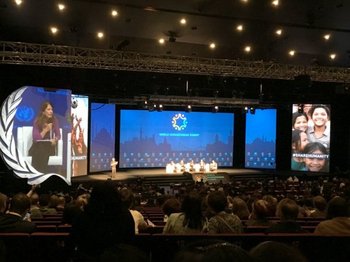This month marks three years since the World Humanitarian Summit (WHS) was held in Turkey. Then, 63 humanitarian studies scholars in conjunction with the International Humanitarian Studies Association (IHSA) got together to discuss how ethical humanitarian studies can contribute to the responses to humanitarian crises. Throughout the WHS the scholars drafted and agreed upon the WHS Statement of Commitments, six of which relate to furthering ethical humanitarian studies. This document is translated in Spanish as well.
What happened with these Commitments? To shed light on this question IHSA’s working group on ethics held a brief survey among six signatories focused on achievements made in 2018.
Committed to the commitments
Overall, the findings make clear that at the individual level, participants are positive about the commitments, and continue to share the values of inclusive, transdisciplinary humanitarian studies that pays special attention to strengthen the research and educational capacities in crisis-affected countries.
However, there was a mixed picture towards the institutional buy-in of the commitments. Research institutions vary greatly in the extent in which they promote (or impose) ethical standards, especially when it concerns the ethics of collaboration and restitution of findings to the affected communities and communities of practice. At least some humanitarian researchers found themselves institutionally isolated in their effort to work in line with (parts of the) WHS Statement. One researcher phrased it as follows: “Paradoxically, I face problems with some of my colleagues that do not want to carry out field research […] and it is hard to find scholars, who do good, elaborate field research.” More generally, the findings suggest that signatories and their respective research institutions did not consider in a systematic fashion the ethical questions raised by the statement of commitments, in particular whether humanitarian studies ethics should be different or more elaborate than the general ethical commitments of research.
Actions but no plan of action
The survey findings suggest that signatories and their institutions are increasingly involved in a larger number of concrete actions or initiatives in line with the WHS Commitments. While ample examples emerged, the survey results appear to suggest that institutions have not developed systematic plans of action for ethical humanitarian research. Some of the examples related to seeking collaboration with asylum seekers in the country the research

Photo credit: Flickr/ Platform on Disaster Displacement
institution is based, hosting regional conferences, or expanding the methodological research base by incorporating more skype-based research and making more material available on institutional webpages. Other examples are more focused on collaboration between research institutions, such as becoming part of global and regional collaborations.
Perverse disincentives for ethical humanitarian studies
The survey asked about challenges in their effort to fulfil the WHS statement of commitments. The ones mentioned most often relate to institutional constraints, buy-in and preparedness. In general, survey participants noted that the ‘normal’ practices of universities tends to disincentivise ethical action. In relation to the role of research institutions, a respondent observed that, despite various good exceptions to the rule, “… the universities, or better the academic incentive system, do not necessarily place transdisciplinary research or enfranchisement of local communities at the core of their work. Obtaining external funding and publishing in highly-rated journals (to advance an academic career) receive more attention and tend to lead to mono-disciplinary approaches to satisfy funders, reviewers and university administrations….” Other challenges raised related to human resource capacity, field conditions (including insecurity and access), information management tools and the capacity of national and local systems.
Despite the limited universe of this survey, it is safe to conclude that in order to further ethical humanitarian studies, it is important to continue the debate on what constitutes ethical humanitarian studies. The WHS commitments have ethical implications beyond the usual notion of informed consent and other aspects of data-collection. They lay down an ambition where humanitarian studies, without losing its academic independence, strive to be inclusive, transdisciplinary and communicative (i.e. to collaborate where possible, involve affected communities and practitioners in the design and implementation of research and to report back findings to stake holding communities).
The survey provides a window in evolving practices, and it is timely to continue the debate and consider more systematically what ethics of humanitarian studies entail and how they can be put into practice. As members of the Working Group on Ethics of the International Humanitarian Studies Association, we would love to hear your suggestions!